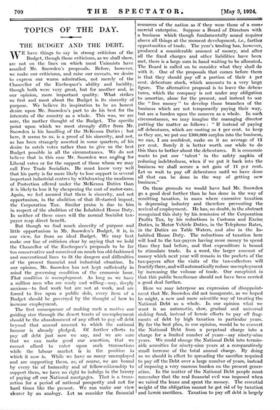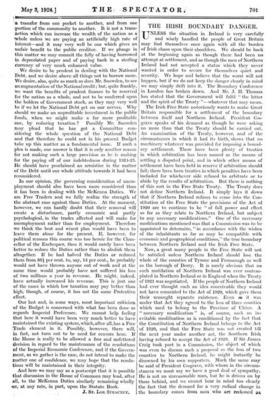W E have things to say in strong criticism of the
Budget, though those criticisms, as we shall show, arc not on the lines on which most Unionists have assailed Mr. Snowden's proposals. Before, however, we make our criticisms, and raise our caveats, we desire to express our warm admiration, not merely of the Chancellor of the Exchequer's ability and lucidity, though both were very great, but for another and, in our opinion, more important quality. What strikes us first and most about the Budget is its sincerity of purpose. We believe its inspiration to be an honest desire upon Mr. Snowden's part to do his best for the interests of the country as a whole. This was, we are sure, the mother thought of the Budget. The specific point upon which we most strongly differ from Mr. Snowden is his handling of the McKenna Duties ; but here, it seems to us, is a proof of his sincerity, and not, as has been strangely asserted in some quarters, of his desire to catch votes rather than to give us the best Budget possible in all the circumstances. We do not believe that in this case Mr. Snowden was angling for Liberal votes or for the support of those whom we may call Free Trade Socialists. He must know very well that his party is far more likely to lose support in several important industrial centres by withdrawing the modicum of Protection offered under the McKenna Duties than it is likely to lose it by cheapening the cost of motor-cars. Again, we feel assured that there is sincerity, and not opportunism, in the abolition of that ill-starred impost, the Corporation Tax. Similar praise is due to him in respect of the abolition of the Inhabited House Duty. In neither of these cases will the normal Socialist tax- payer reap direct benefit.
But though we find much sincerity of purpose and little opportunism in Mr. Snowden's Budget, it is, in our view, far from an ideal Budget. We may best make our line of criticism clear by saying that we hold the Chancellor of the Exchequer's proposals to be far too conservative and conceived on much too old-fashioned and conventional lines to fit the dangers and difficulties of the present financial and industrial situation. In our opinion, Mr. Snowden has not kept sufficiently in mind the governing condition of the economic hour. That condition is unemployment. As long as we have a million men who are ready and willing—nay, deeply anxious—to find work but are not at work, and arc forced to live upon a public dole, every item of a Budget should be governed by the thought of how to increase employment.
The first consequence of making such a motive our guiding star through the desert tracts of unemployment should be the abandonment of any effort to pay off debt beyond that annual amount to which the national honour is already pledged. Of further efforts to pay off debt just now we say, and Ave arc sure that we can make good our assertion, that we cannot afford to enter upon such transactions while the labour market is in the position in which it now is. While we have so many unemployed and are supporting them, as; of course, we are bound by every tie of humanity and' of fellow-citizenship to support them, we have no right to indulge in the luxury of paying off our National martgages. That is a trans- action for a period of national prosperity and not for hard times like the present. We tali make our view -clearer by an analogy. Let us consider the financial resources of the nation as if they were those of a corn+ mercial enterprise. Suppose a Board of Directors with a business which though fundamentally sound requires- above all things at the moment development, i.e., further opportunities of trade. The year's trading has, however, produced a considerable amount of money, and after all the fixed charges and other liabilities have been met, there is a large sum in hand waiting to be allocated. The Board is called on to consider what they shall do with it. One of the proposals that comes before them is that they should pay off a portion of their 4 per cent. debenture stock, which amounts to a very large figure. The alternative proposal is to leave the deben- tures, which the company is not under any obligation to amortize, alone for the present, and instead to use the " free money " to develop those branches of the business which are not temporarily paying their way, but are a burden upon the concern as a whole. In such circumstances, we may imagine the managing director putting the matter as follows : " If instead of paying off debentures, which are costing us 4 per cent. to keep as they are, we put our £500,000 surplus into the business, we can, I am confident, make on it an average of 15 per cent. Surely it is better worth our while to do this than to bother about the debentures. It is economic waste to put our ' talent ' in the safety napkin of reducing indebtedness, when if we put it back into the business we shall secure a net gain of 11 per cent: Let us wait to pay off debentures until we have done all that can be done in the way of getting new business."
On these grounds we would have had Mr. Snowden go a good deal further than he has done in the way of remitting taxation, in cases where excessive taxation is depressing industry and therefore preventing the revival of employment. He has, no doubt, in the abstract recognized this duty by his remission of the Corporation Profits Tax, by his reductions in Customs and Excise Duties, in Motor Vehicle Duties, in the Telephone Rates, in the Duties on Table Waters, and also in the In- habited House Duty. The reductions of taxation here will lead to the tax-payers having more money to spend than they had before, and that expenditure is bound to stimulate trade. In a word, the larger amount of money which next year will remain in the pockets of the tax-payers after the visits of the tax-collectors will fructify there, and will automatically reduce unemployment by increasing the volume of trade. Our complaint is that this public beneficence should not have been carried a good deal further.
Here we may interpose an expression of disappoint. ment that Mr. Snowden did not inaugurate, as we hoped he might, a new and more scientific way of treating the National Debt as a whole. In our opinion what we want is an automatic, slow, gradual and universal sinking fund, instead of heroic efforts to pay off frag- ments of debt by high taxation in particular years. By far the best plan, in our opinion, would be to convert the National Debt from a perpetual charge into a charge for a limited number of years—say ninety-nine years. We could change the National Debt into termin- able annuities for ninety-nine years at a comparatively small increase of the total annual charge. By doing so we should in effect be spreading the sacrifice required to pay off the Debt over a large number of years, instead of imposing a very onerous burden on the present gener- ation. In the matter of the National Debt people must remember that the real financial evil was imposed when we raised the loans and spent the money. The essential weight of the obligation cannot be got rid of by taxation and heroic sacrifices. Taxation to pay off debt is largely \ a transfer from one pocket to another, and from one portion of the community to another. It is not a trans- :action which can increase the wealth of the nation as a 'Whole unless we are paying an artificially high rate of interest—and it may very well be one which gives an 'unfair benefit to the public creditor. If we plunge in this matter we may commit the folly of having borrowed in depreciated paper and of paying back in a sterling currency of very much enhanced value.
We desire to be prudent in dealing with the National Debt, and we desire above all things not to borrow more. We desire, also, quite as much as does Mr. Snowden, to see an augmentation of the National credit; but, quite frankly, we want the benefits of prudent finance to be reserved for the nation as a whole, and not to be conferred upon the holders of Government stock, as they may very well be if we let the National Debt get on our nerves. Why should we make an unprofitable investment in the public funds, when we might make a far more profitable one, by reducing taxation ? Possibly Mr. Snowden may plead that he has got a Committee con- sidering the whole question of the National Debt and that therefore he could not in his present Budget take up this matter as a fundamental issue. If such a plea is made, our answer is that it is only another reason for not making such a large provision as he is making for the paying off of our indebtedness during 1924-25. He should have proclaimed an armistice in the matter of the Debt until our whole attitude towards it had been reconsidered.
In our opinion, :the governing consideration of unem- ployment should also have been more considered than it has been in dealing with the McKenna Duties. We are Free Traders and we fully realize the strength of the abstract case against those Duties. At the moment, however, we can hardly doubt that their removal will create a disturbance, partly economic and partly psychological, in the trades affected and will make for unemployment rather than for employment. Therefore we think the best and wisest plan would have been to !leave them alone for the present. If, however, for political reasons this course was too heroic for the Chan- cellor of the Exchequer, then it would surely have been 'better to reduce the Duties rather than to abolish them altogether. If he had halved the Duties or reduced them from 831 per cent. to, say, 15 per cent., he probably would not have thrown anyone out of work and at the same time would probably have not suffered his loss of two millions a year in revenue. He might, indeed, have actually increased his revenue. This is just one of the cases in which low taxation may pay better than high, though, of course, it has not the same Protective effect.
Our last and, in some ways, most important criticism of the Budget is concerned with what has been done as regards Imperial Preference. We cannot help feeling that here it would have been very much better to have maintained the existing system, which, after all, has a Free Trade element in it. Possibly, however, there will, in fact, not turn out to be need for censure here. If the House is really to be allowed a free and unfettered decision in regard to the maintenance of the resolutions of the Imperial Economic Conference, and if the Govern- .inent, as we gather is the case, do not intend to make the matter one of confidence, we may hope that the resolu- tions will be maintained in their integrity.
And here we may say as a postscript that it is possible that discussion in the House of Commons may lead, after all, to the McKenna Duties similarly remaining wholly ■ or, at any rate, in part, upon the Statute Book. J. ST. IdOE STRACIIEY.















































 Previous page
Previous page